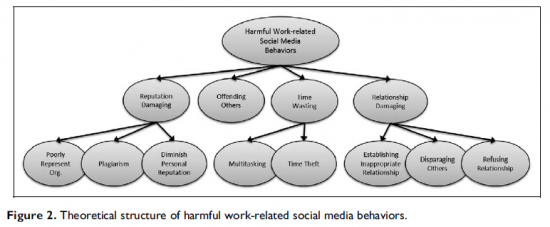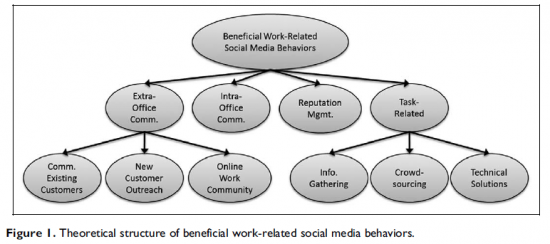People That Think Social Media Helps Their Work Are Probably Wrong
![]() In an upcoming special issue of Social Science Computer Review, Landers and Callan1 set out to understand how people actually use social media while at work and how it affects their job performance. By polling workers across a wide variety of jobs (across at least 17 industries), they identified 8 broad ways that people use social media that they believe help their work, and 9 broad ways that people use social media that they believe harm their work. Although the harmful social media behaviors were related to decreased job performance, the beneficial social media behaviors were unrelated to job performance. In short, wasting time on social media hurts you, but trying to use social media to improve your work probably doesn’t actually help.
In an upcoming special issue of Social Science Computer Review, Landers and Callan1 set out to understand how people actually use social media while at work and how it affects their job performance. By polling workers across a wide variety of jobs (across at least 17 industries), they identified 8 broad ways that people use social media that they believe help their work, and 9 broad ways that people use social media that they believe harm their work. Although the harmful social media behaviors were related to decreased job performance, the beneficial social media behaviors were unrelated to job performance. In short, wasting time on social media hurts you, but trying to use social media to improve your work probably doesn’t actually help.
To conduct this study, the researchers conducted a series of three studies:
- In Study 1, 203 workers across 17 industries provided two critical incidents, one describing a situation where they used social media at work that they believed harmed their job performance, and the other describing a situation where they used social media at work they believed to help their performance. The researchers then conducted a content analysis of these critical incidents to develop 9 “good” behaviors and 9 “bad” behaviors.
- In Study 2, 204 additional workers completed a questionnaire measured the 18 dimensions developed in Study 1. Confirmatory and exploratory factor analyses were used to improve the measurement characteristics of these questionnaires and refine the theoretical model of social media-related behaviors. One of the “good” dimensions, “Relaxation and Leisure” did not load onto a higher-order factor like the other “good” behaviors and was removed from that measure.
- In Study 3, 100 additional workers completed the final questionnaire developed in Study 2 alongside self-report measures of job performance. This provided cross-validation evidence for the measure (reliabilities remained similar between Studies 2 and 3) and also criterion-related validity evidence.
The results of Study 2 (the final social media behavioral taxonomies) are summarized in the following two figures.
 Thus, the 8 dimensions of social media behaviors that people think will help their work performance are:
Thus, the 8 dimensions of social media behaviors that people think will help their work performance are:
- Communicating with existing customers
- New customer outreach
- Participating in an online work community
- Intra-office communication
- Reputation management
- Information gathering
- Crowdsourcing a problem
- As the technical solution to a problem (e.g., for file transfer)
Using factor analysis, it was discovered that these 8 dimensions mapped onto four higher-level dimensions:
- Communicating with people outside the office
- Communicating with people inside the office
- Managing the employee’s or the organization’s online reputation
- Trying to solve work problems using social media
The 9 dimensions of social media behaviors that people think harm their work performance are:
- Poorly representing the organization
- Plagiarism or otherwise stealing ideas and representing them as their own
- Reputation-harming behaviors
- Saying something that offends someone
- Multitasking (doing too many things at once)
- Time theft (using social media recreationally on the clock)
- Establishing inappropriate relationships with customers and coworkers
- Making comments that disparage others
- Receiving a friend request, refusing it, and experienced subsequent awkwardness
Using factor analysis again, it was discovered that these 9 dimensions mapped onto four higher-level dimensions:
- Reputation damaging
- Offending others
- Wasting time
- Harming interpersonal relationships
It was in Study 3 that the relationship between the social media behaviors and job performance was determined. Consistently, negative social media behaviors (e.g., plagiarism, mutlitasking, time theft) were correlated with lower job performance (across task, contextual, counterproductive, and adaptive dimensions). But in contrast, positive social media behaviors (e.g., crowdsourcing a problem, identifying new customers) were not generally correlated with job performance at all.
The researcher then make the following practical recommendation:
These findings suggested that simply granting employee access to social media is unlikely to improve job performance unless a specific plan is in place to take advantage of the capabilities it provides. In fact, permitting employee access to social media broadly may be generally harmful to job performance and cannot be recommended based upon these results.
The validation study is somewhat limited in that the job performance measures were self-report, which relies on people’s ability to self-assess their own job performance accurately. Future research should investigate the scale developed here (the Work-Related Social Media Questionnaire [WSMQ]) with more traditional job performance measures (e.g., supervisory ratings).
This study also examines social media behaviors quite broadly; there are probably specific industries or jobs where social media use would be beneficial or even within job requirements. Future research should investigate such positions in particular.
If you’d like to use the WSMQ in your own research, you can find both the beneficial behaviors scale – the WSMQ(+) – and the harmful behaviors scale – the WSMQ(-) – at http://rlnd.us/wsmq.
Also see I/O at Work’s coverage of this article.
- Landers, R.N., & Callan, R.C. (2014). Validation of the Beneficial and Harmful Work-related Social Media Behavioral Taxonomies: Development of the Work-related Social Media Questionnaire Social Science Computer Review DOI: 10.1177/0894439314524891 [↩]
| Previous Post: | Free Gamification of Human Resources Webinar Coming April 15 |
| Next Post: | Should You Keep Using Paper Advertisements to Recruit Job Candidates? |
Trackbacks and Pingbacks
- Performance Enhancing Media? | Odd Lots
- Links 14/4/2014: MakuluLinux, Many Games, More Privacy News and Pulitzer Prize for NSA Revelations | Techrights
- IT In The D - Episode 38: Heartbleed, training and your career, rants, news and more | IT in the D
- Não perca tempo no trabalho com redes sociais » Poupar Melhor




I rarely use social media at office as of now.
The job cannot stop you from using social media. I use my tablet when I am not working during the day at work. I need to check my email or send one. The job is not going to be able to stop the worker from being on social media. Unless they are sitting in their offices checking Facebook and Twitter all day. Then the bosses would not be productive either. Right?
Many workplaces do categorically block social media on the workplace network (except email, perhaps) – for example, YouTube, Facebook, Twitter, etc, which does prevent people from using it on their office computers and while on the company wifi. That does leave personal cell phones with data plans though – there is less you can do about that, although there are at least a few organizations that forbid personal phone use while at work. Personally, that strikes me as a bit extreme.